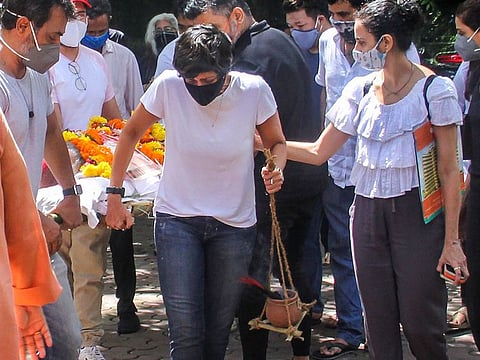Thank you, Mandira Bedi — for hitting hard at patriarchy
Let actor’s decision to light her husband’s pyre light a million resolves across India

She led the bier. She lit the pyre.
Hats off Mandira Bedi for showing us that impediments to gender equality can and must be breached in a community that has for far too long allowed itself into a languorous resignation to a patriarchal and at times even masochistic social order.
On June 30, last Wednesday, Bollywood actor Mandira’s husband, Raj Kaushal, 49, a film producer, passed away in Mumbai after suffering a cardiac arrest, leaving Mandira and the couple’s ten-year-old son Vir and five-year-old daughter Tara shell-shocked.
Later that afternoon, an image went viral on Instagram, showing Mandira being consoled by a Bollywood actor just outside her residence. The very next moment, she, dressed in a white T-shirt and blue denim, is seen instructing some of the support staff members and close relatives and friends on getting the funeral bier in place for the last journey.
But the real surprise came about an hour later as Mandira actually lent her shoulders to the bier, along with a few other men, and in a brave and audacious departure from norm, she actually lit her husband’s pyre at the Shivaji Park Crematorium — throwing a centuries-old custom out of the window!
Eldest son’s prerogative
It is customary for the men in Hindu families in India to lead the funeral bier and it is always the eldest son’s prerogative to light his parent’s pyre at the crematorium. Going by that custom, ten-year-old Vir ought to have lit the pyre – apologies for the surreal feeling that the very thought ignites.
But Mandira decided to shield her minor son from a harrowing experience — having to light the flames on to the mortal remains of a person who until a few hours ago had played such a doting father! Vir, for sure, would have been mentally, psychologically scarred for the rest of his life for having undergone such a trauma – all for the sake of ‘custom’.
So Mandira stepped in, not only deciding to lend her shoulders to the bier, but also to light the pyre — thereby playing guardian angel to her minor son in every sense of the term and in the process, delving a massive figurative blow to a patriarchal order in a country and community where a sizeable number still believes that right from being fed first at the family dinner table to lighting a parent or family member’s pyre, it’s a male prerogative to reduce the female members in family and society to a subliminal existence.
Eons of courage
In a country where, according to a United Nations estimate in 2020, around 2,000 girl fetuses are aborted every day; where mainstream commercial cinema at times glorifies, so to speak, the machismo of harassing the female lead as part and parcel of an on-screen depiction of ‘bold romance’; where a ‘boys-will-be-boys’ mentality among a section of the population often seeks to even justify rape; where women and girls have to regularly subject themselves to medieval lecturing on what to wear, who to hang out with and what kind of jobs to pick; where skin colour of a prospective bride is the sum and substance of Sunday matrimonial columns across newspapers; and where a woman’s worth is judged in terms of how good or bad was the last meal she cooked or whether she had walked out of the maternity ward the last time around with a boy or a girl in lap ... in such a country and society, it takes eons of determination and galls to defy ‘custom’ and ‘tradition’ and walk the talk like the way that woman in a white ‘T’ and blue denim did on a sultry July afternoon in Mumbai last week.
Submission to machismo
True, one Mandira Bedi will not bring about an overnight change. It is equally true that in millions of households across India, vast majority of girls and women may not be having the gift of education and the good fortune of having to grow up in a liberal culture, like Mandira did.
In that sense, one Mandira Bedi may not make any difference to an entrenched social order where submission to machismo and adherence to a patriarchal diktat are baked into the psychological templates of girls even before they learn to differentiate between the gender-specific toys they and their male siblings are made to play with.
And mind you, we aren’t just talking about rural India here. These are truths that are prevalent even in households across cities and semi-urban areas with relatively better access to education and civic amenities.
The silver lining
However, the silver lining is that as the world’s sixth-largest economy by nominal gross domestic product and the third-largest in terms of purchasing-power parity goes from strength to strength, riding a massive middleclass-fuelled consumer boom, aspiration levels will keep going up and as the benefits of an open, competitive market-driven economy keep percolating down from boardrooms to single-room, thatched-roof households in the hinterlands, a Mandira Bedi-like boldness may well get equated with being aspirational and ambitious — even if in its most rudimentary terms. More so, given Mandira’s image as a Bollywood star.
And that is reason enough to be hopeful about this white ‘T’ and blue denim lighting the resolve in a million hearts across India — to be agents of change.
Twitter: @moumiayush
Sign up for the Daily Briefing
Get the latest news and updates straight to your inbox








